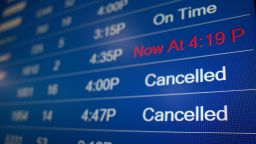The House on Thursday passed a Federal Aviation Administration reauthorization bill to renew funding for the agency for the next five years.
The bipartisan bill aims to make improvements to efficacy and operations at the agency, expand the workforce for the aviation industry, invest in airport infrastructure and improve the general public’s passenger experience for air travel. The measure was approved on a bipartisan basis – 351 to 69.
The Senate has not yet passed its own version of an FAA reauthorization bill.
Among a wide range of provisions, the bill directs the FAA to increase hiring targets for air traffic controllers, sets up workforce development programs to improve recruitment and retention in the aviation industry, and raises the retirement age for commercial airline pilots from 65 to 67. The bill also reauthorizes the National Transportation Safety Board through fiscal year 2028.
One closely watched amendment to the bill was offered by GOP Rep. Burgess Owens of Utah that would add seven roundtrip flights daily from Washington’s Ronald Reagan National Airport.
The issue has crossed partisan lines as some lawmakers argue that adding flights will give consumers more choice and bring down prices, while others say it would increase congestion and delays at the airport. The amendment failed by a vote of 205 to 229.
A handful of potentially contentious amendments also failed Wednesday evening, clearing the way for the final vote Thursday.
In a statement of administration policy, the White House said it supports enacting an FAA reauthorization bill and “applauds the bipartisan work of the House Transportation and Infrastructure Committee.”
The statement said the House bill “would enhance aviation safety; invest in and improve on-the-job safety for our aviation workforce … strengthen passenger rights; and improve our aviation infrastructure.”
But the White House outlined concerns as well, related to issues such as the protection of consumer rights, agency restructuring, standards for airport service workers and age standards for pilots.
“The bill includes a provision that would raise the retirement age for pilots in commercial operations. Making this change without doing research and establishing any necessary policies would be outside the international standard,” the statement said.
“The administration looks forward to working with the Congress to address the administration’s concerns,” it said.






